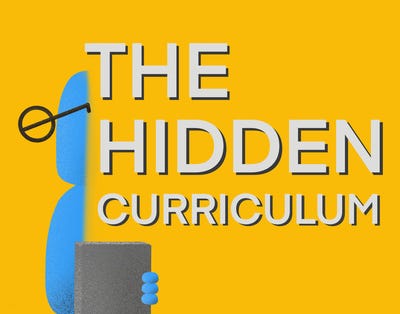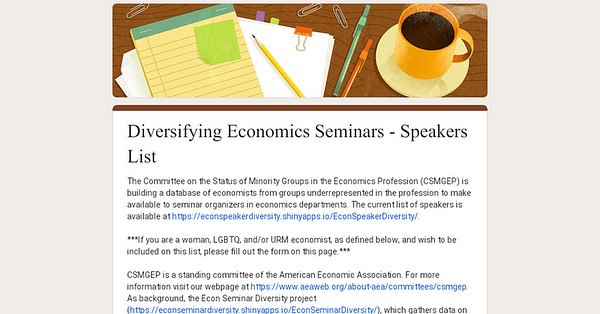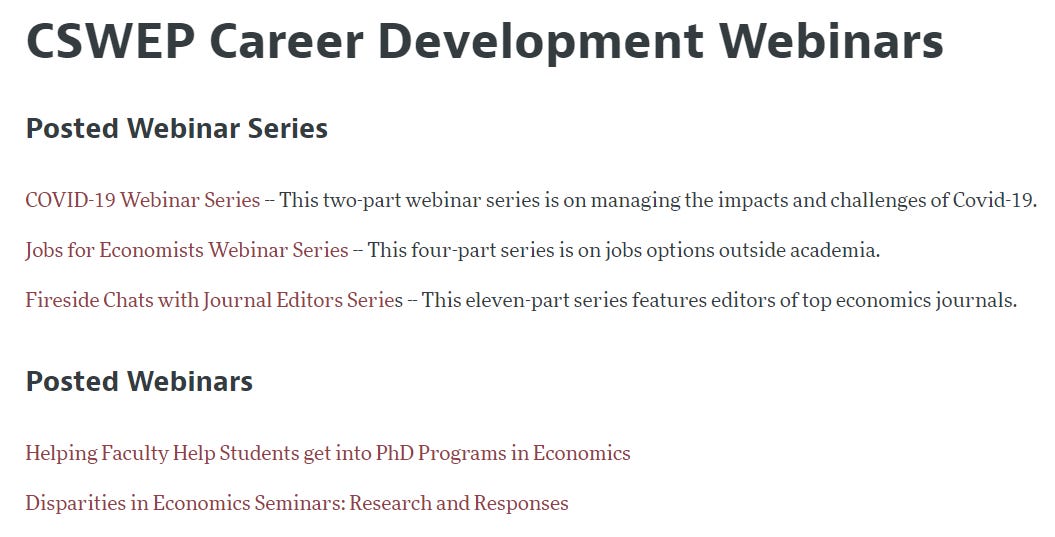Economists must build a better community: Practical advice on how to do it!
We often celebrate the lone genius and neglect the community. Economics pays a steep price for worship of "raw smartness" and its exclusivity. Time to fix the problem.
David Card, Josh Angrist, and Guido Imbens are the latest additions to the ‘Pantheon of Great Economists.’ Imagine another world in which they had no students, no one read their work, they did not inspire others to extend their findings or use their tools. In that world, no Nobel. Worst of all, their ideas would’ve stopped with them.
It happens. Pathbreaking work is passed over. ‘Genius’ is not necessary or sufficient. So, what is necessary? A vibrant, open, intellectually diverse community. Economics is not that. Our science and people suffer because of it. One researcher may create a vision for where the frontier of knowledge should go. It’s a community of researchers who makes that vision a reality.
Source: University of New England.
You know how I feel about the brokenness of economics. And how I feel about its promise to do good in the world. I am right. I talk with countless early-career and seasoned economists whose work we all should know but don’t. At least two mentoring calls a week for the past few years and many before that. It time to build a stronger, more intellectually diverse community We have work to do. It’s doable.
We can do it, together!
In today’s post, I offer practical tips for economics at all career stages and degree of privilege. The MOST responsibility lies with current members, especially the senior leaders. No more excuses. But I’m a realist too. People outside ‘The Club’ need tips on how to join and revitalize our community.
Tip #1: Share your research with others.
Tell other people what you have learned. After you write a paper, SEND IT TO OTHERS who research in that area. People you cite are a good place to start, since they care enough about the topic to study it too.1 Think broadly and don’t just aim for the ‘Big Fish.’ Early-career academics are great, as are economists at government agencies, thinktanks, etc. and scholars in related disciplines.
Ask for feedback. Early-career economists should go a step further: introduce yourself, tell them how your work connects to theirs, and ask for feedback. Something like, “Could read my abstract and give me some feedback? It would be very helpful.” Keep it short. Be specific. If you don’t hear back, send a polite follow-up email a few weeks later. Then move on. Contact others.
Apply and ask. Surefire way not to get something? Don’t apply or don’t ask. Apply to conferences and funding. Ask departments, thinktanks, agencies, or other groups about seminars or informal series where you could present. Rejection hurts, but if you aren’t hearing “no” sometimes, then you aren’t asking enough. A big “yes” makes it all worth it. I promise. I know.
Give platforms to new voices. Senior people, let your junior co-authors present always. Prepare and coach them. Organizers of seminars and conferences, invite economists (early-career and later-career stage) who your group has not heard from before. Seek out new voices and new ideas. WORK AT IT. THESE ECONOMISTS EXIST. YOU’RE THE ORGANIZER. ORGANIZE.
Tip #2: Get out there.
Be present. Attend seminars, conferences, or other events (virtual too). You will learn about research, and you will meet researchers. Organizers run hybrid in-person/virtual events, including informal gatherings to lower the ‘cost’ of entry.
Ask questions. At a talk if you have a question, someone else in the room likely does too. Ask it! To build confidence, prepare. Read the paper ahead of time and write down questions. Some the speaker will answer. Some they won’t. Keep your question brief, and it must end with “?” Listen to the answer. Follow up. Senior people in the room, affirm the question.
Meet people. Use coffee breaks, dinner, or other informal gathers to meet new people. It’s good practice regardless of who you are in the profession. Set a goal like, I am going to try to meet three people. Research is a good icebreaker.
Have a sense of humor and be kind to yourself. Sometimes conversations are awkward.2 Sometimes you are too tired or freaked out to make the effort. That’s okay. We are not selected for social skills, we are selected for our work.
Be safe. Sometimes it goes way off the rails. If you are unsafe or uncomfortable, walk away. If you are more senior in the group or know the person who is being inappropriate or is upsetting others, pull them aside and tell them to stop.
Tip #3: Welcome others in.
Our community will not grow unless current members make an effort it. Without effort we end up with a close-minded, boring ‘old boys network.’ New questions lead to new knowledge. New people bring new questions.
Senior people go meet some junior people and others you don’t know. Break the ice. It’s easier for you to start a conversation. Be pro-social and cut newbies some slack if they say something awkward or stand there and say nothing. Ask them what they work on. Ask them if they are enjoying the conference. Be nice.
Organize intellectually diverse conferences or a panels. Work at it until you have a set of diverse speakers, diverse on many dimensions. You’re introducing them to the community, and they will draw a new audience. Make the call for papers open and well publicized. Do outreach. Make a real effort. No more excuses.
Host a breakfast, dinner, or other social event (not at a bar). Could be virtual too. Get some of your pro-social senior friends to attend along with junior/new people. Ensure that the two groups sit together or otherwise interact. Move around. Save your class reunion and co-author meet up for another time.
Building a community takes time and effort. Vibrancy does not just happen on its own. See economics. It will be a bumpy ride. That’s life. Keep pushing. No guts no glory. As Janet Yellen said recently,
“You often have to do things that are scary at some level,” she said. “You just have to force yourself to face up to it and do it. You have to pull up your socks and do what you were hired to do.”
My post only scratches the surface on ways to build a stronger community in economics. Here is more advice from others:
Organizing conferences is another great way to meet people. PS “The Hidden Curriculum” podcast by Sebastian Tello-Trillo and Alex Hollingsworth is excellent.


Find your community. I am firmly against silos, but we all need spaces and people to recharge. #EconTwitter could be one of those for you. It is for me.

Twitter is absolutely not the only way to find a community. What’s important is you find one. It will not come to you.

No more excuses for conference and seminar series organizers. HERE IS A DATABASE OF ECONOMISTS WHO BRING NEW VOICES! Add your name if you are in these under-represented groups.



The Committee on the Status of Women in the Economics Profession (CSWEP) has a wealth of resources for economists (of any gender identity). Here are new webinars:
Finally, every economist, especially senior members of the profession, MUST MUST MUST read this AMAZING guide from the American Economics Association: Best Practices for Economists: Building a More Diverse, Inclusive, and Productive Profession. by Bayer, Amanda, Şebnem Kalemli-Özcan, Rohini Pande, Cecilia Elena Rouse, Anthony A. Smith Jr., Juan Carlos Suárez Serrato, and David W. Wilcox.
Read the guide and commit to at least two new practices. Get your department or institution to commit too. Do them and then choose two more. Rinse and repeat.
Get creative. Be committed. A stronger community leads to more knowledge. That’s what we are here for, creating knowledge and sharing it with the world. We can accomplish so much more together than alone. #goteam
This strategy has risks. Sometimes you will get a rude reply. Tell them thank you and move on. It’s not you, it’s them who has a problem. Worst case, they scoop your research. It’s very rare but does happen. To lower the risks, talk to your adviser or a mentor before you send the emails. Whisper network is real. All that said, I truly believe the potential rewards outweigh the risks, but it’s best to know what could happen.
My first time at the NBER Summer Institute I went to breakfast and scanned the room for a place to sit. It was too early in the morning (pre-coffee) to go sit with the old ‘Big Fish.’ So I found a table with an open seat with younger economists like me. I asked the guy next to open seat, if I could sit down. He stared at me blankly and said nothing. His friend across the table said, “Go ahead. He’s not used to women talking to him.” Wheee!






